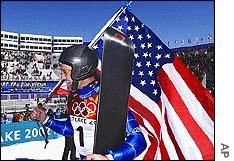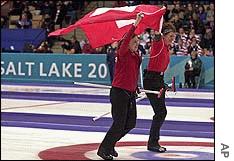
Dollars should win in '12
Forget fairness, concerns about flag waving - Olympics would be better off back in U.S. in 2012.
February 22, 2002: 11:08 a.m. ET
A weekly column by Staff Writer Chris Isidore
|
 SALT LAKE CITY, Utah (CNN/Money) - The decision on where to hold the 2012 Summer Olympics is one of those circumstances when big dollars should trump basic fairness.
SALT LAKE CITY, Utah (CNN/Money) - The decision on where to hold the 2012 Summer Olympics is one of those circumstances when big dollars should trump basic fairness.
There will be an outcry in many nations if the United States is awarded its fifth Olympics since 1980 when the site is selected by the International Olympics Committee in 2005.
Critics will say this year's Winter Games in Salt Lake City have contained too much flag-waving, and have been too great of a nationalistic celebration of the United States and its war on terrorism, not the ideal of a neutral celebration of sports and competition.

|
|
|
While some other countries have objected to U.S. flag waving at this year's Winter Olympics, returning the games to America in 2012 would be good for the games. | |
They will say that home field gives too much of an advantage to the U.S. team, which already has all types of financial and training advantages. They will point out that neither Africa and South America have ever had a chance to host an Olympics.
They will be right on all counts.
And yet, from a strict business sense, the Olympics should be held in the United States as often as possible. Business is really what should matter the most for the athletes from all nations when deciding on an Olympics host. The games haven't been about pure athletic competition since well before hickory skis and laced ski boots could be found in competition.
The Olympics depend primarily on broadcasting revenue and sponsorships to produce the millions to stage the games. And that money overwhelmingly comes from U.S. companies.
The $545 million NBC is spending for U.S. broadcast rights for these games represent about three-quarters of the money paid by broadcasters worldwide. Of the 10 top sponsors of the International Olympic Committee, who give sponsor dollars to every national team, eight are U.S.-based companies. And for many national teams those sponsorship and broadcast dollars are a significant portion of the operating budgets they use to support athletes and compete in the games.
U.S. broadcasters and sponsors will continue to pay the hundreds of millions that they do whether the games are here or overseas. But a U.S.-based game is far more valuable for most of them. And thus a U.S. venue ends up being more valuable to the athletes themselves.
The dominance of the United States in Olympic dollars shouldn't be any surprise - in every major sport other than soccer, the world's best athletes, no matter what nation they call home, are already drawn to the United States.
The National Hockey League and National Basketball Association, which both send their players to compete in the Olympics, are seeing a greater proportion of its players come from outside of North America. Even the Russian figure skating pair Anton Sikharulidze and Elena Berezhnaya, who are part of the focus of their nation's protests over perceived unfair treatment, spend most of their time training in Hackensack, New Jersey.
As a U.S. taxpayer, I'd be just as happy if the nation isn't on the hook for hundreds of millions to host another Olympics so soon after Salt Lake.
As a New Yorker, I'm not particularly looking forward to dealing with the hassles of moving through an metropolitan area where commuting could be considered an Olympic-level sport in the best of times, no matter what assurances organizers make about how painless they can make if for athletes, residents and visitors at a 2012 New York games.
While many American viewers may not realize it, many overseas Olympic fans have been upset with what they believe is too great of a nationalistic flavor to this year's Winter Olympics. Part of that maybe due to the close proximity to the Sept. 11 terrorist attack. The patriotic flavor may wane a bit by 2012, although don't count on that if the games were held in New York, which will still be struggling to recover from the attack.
| |

|
|
Even the Swiss can find reason to wave the flag at the Olympics, as they did after this curling match. | |
But the fact is that the way that all Olympics, no matter the location, are structured to celebrate nationalistic flag waving as much or possibly more than the celebration of sports.
The only way to prevent that is not have national teams at all. Instead have each sport qualify the top world's athletes regardless of nationality for the competition, the way that major golf and tennis tournaments already do. Let teams bring together the best athletes they can afford, regardless of their passports.
That won't happen. Patriotism is part of the reason that the Olympics are far more closely watched than any sporting event outside of soccer's World Cup, which is also a celebration of the marriage of nationalism and athleticism.
So other nations' pride or some sense of "fairness" shouldn't be allowed to get in the way of picking the site that makes the most sense to both athletes and fans. While it sounds crass to say so, this is one time that the almighty dollar would be a deserving champion. 
Click here to send mail to Chris Isidore
|
| SPECIAL: |
|
|
|
|
|

|

